
Hey boys and girls, in 2012, a star shot out of the hallowed Madison Square Garden arena and blasted through the pop culture stratosphere. Knicks point guard, Jeremy Lin, a many times passed-over, oft-rejected benchwarmer became an overnight sensation when he electrified New York City and the sports world with his dynamic, record breaking plays. The fact that Lin is Asian-American was a cause for worldwide exultation, as well as racial controversy. Linsanity: The Movie chronicles Linís hard fight for survival in the NBA and the far-reaching effects of his meteoric fame.
Hereís our exclusive chat with NBA Superstar, Jeremy Lin, Producer Brian Yang and Director Evan Jackson Leong.
Dig it!
Linsanity: The Movie
Jeremy Lin
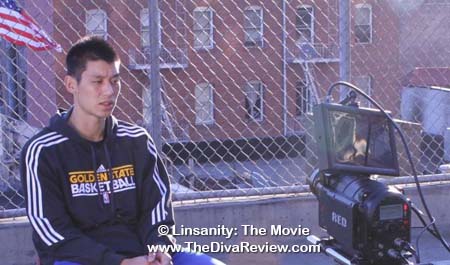 The
Lady Miz Diva: How was the idea of a documentary first put to you?
The
Lady Miz Diva: How was the idea of a documentary first put to you?
Jeremy Lin: They pitched it when I was in college and I really wasnít comfortable with it. I would say after my rookie year, I really had gotten used to the idea of having cameras around and stuff and I thought, ĎThis is cool.í We could create some footage of my story that Iíll be able to one day show my kids and grandkids.
LMD: So these same filmmakers knew you back when you were in college?
JL: Yeah. They had pitched it for like, two years, maybe. After two years, I agreed to it. They did a great job of pitching the idea.
LMD: You mentioned not being used to the cameras, so how did you get used to having them on you 24/7? Were there any no-go areas?
JL: I think I got more comfortable after my first year in the NBA, because there were cameras everywhere. I just got used to them. And then I think what got me to be on board with the documentary was getting comfortable with the producers, the director; getting to know them a little more, having them understand me and my family, what weíre okay with, what weíre not okay with and what we feel was important to the story. They did a great job, and by the end it was like a bunch of friends filming a project. It didnít really feel that much like business just because we had gotten to know each other.
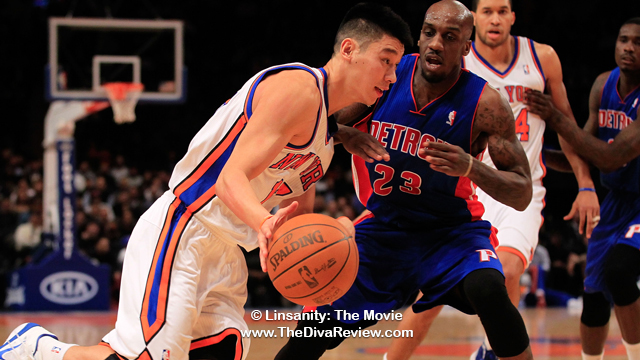 LMD:
What was it like for you to be in the middle of that time in New York
when Linsanity hit and all everyone could talk about was you? What was
the first instance when you knew things were different?
LMD:
What was it like for you to be in the middle of that time in New York
when Linsanity hit and all everyone could talk about was you? What was
the first instance when you knew things were different?
JL: I would say it was really crazy. It was definitely an interesting time. I think it was a lot of fun. On the court, it was a lot of fun. I think even me walking around - Iíd played for the Knicks before, but nobody really cared - I could go anywhere I wanted, or any place where I wanted to sit down and eat and it was fine. And then after that first game, it just went crazy and then kind of just walking around I noticed things werenít the same anymore.
LMD: Was having that sudden scrutiny and support something that boosted you up during your games or an added source of pressure?
JL: I think both. I mean, it was cool to be supported and they supported me as enthusiastically as any fanbase could support any one player, and along with that comes pressure and expectations to perform.
LMD: Iíve spoken to Asian-American friends for whom you are like a symbol of hope and promise. What is it like for you to not only have to worry first and foremost about your performance during a game, but to suddenly be an icon for an entire race of people?
JL: I think that was definitely something that I had to learn to deal with. At one point, it became a lot bigger than basketball, I think. Dealing with a lot of expectations and getting back to the court in terms of, like, ĎOkay, who am I, and why do I play basketball?í and to understand that I play as an act of worship to God, and not for any one human or anybody else. I think getting back to that, reminding myself of that is kind of the key being able to manage it.
LMD: I was shocked to hear some of the blatantly racist comments made by media people and fellow athletes when your star began to rise. Were you aware of that then, or did you just shut it out?
JL: Yeah, I mean Iíve been dealing with that my whole life, and to be honest, it wasnít anything that happened that was really surprising from a racial standpoint, I would say. In fact, Iíve dealt with a lot worse growing up, soÖ In fact, itís pretty mild.
LMD: Have you seen the finished film?
JL: No, I havenít seen the final product. Iíve seen a lot of the edited versions leading up to it, but tonight will be the first time Iím seeing it.
LMD: In the clips that youíve seen, was there anything you wish they hadnít left in?
JL: Naw, I loved it. I loved everything about it.
LMD: Iíve watched Youíve Changed, Bro & the other short films on your YouTube channel. Between those clips and now the feature documentary, how important is the visual medium to you?
JL: I think the main purpose behind the YouTube videos is, in journalism today, the way it works is the media shapes a lot of your persona, or your brand, or what they think of you, and I think doing the YouTube videos, or having the YouTube channel, thatís kind of my way to express who I am in my own eyes to everybody else, and similar with this documentary. You know, a lot of people have talked about Linsanity like, ĎI think Linsanity is this,í or, ĎI think Linsanity is that,í but this documentary is my chance to say, ĎThis is what Linsanity means to me.í
LMD: As a New Yorker who lived through the excitement of Linsanity, and on behalf of the fans and all the bootleg Linsanity t-shirt sellers that want you back to MSG for keeps, I must ask is returning to the Knicks a possibility you think about?
JL: Thatís so far away. To be honest, Iím open to anything in the future. I mean, I donít think Iíve thought that far, to be honest. Iím just kind of focused on the upcoming season, but I would never say never, especially if you know my story and understanding how crazy life can be sometimes.
LMD: Youíre still very young, but the career of a basketball player is a finite and fragile thing. Have you thought about what comes after?
JL: Yeah, I have a foundation where we do work with underprivileged children. Thatís one of my passions. I guess Christian ministry is one of my passions, as well.
Producer Brian Yang
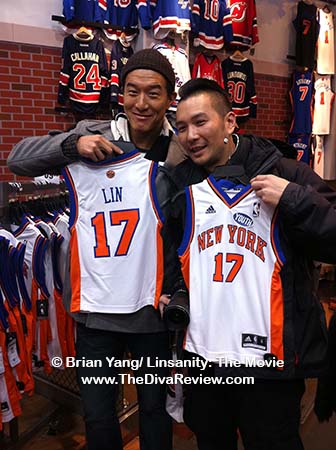 The
Lady Miz Diva: Tell us about the origins of Linsanity: The Movie?
The
Lady Miz Diva: Tell us about the origins of Linsanity: The Movie?
Brian Yang: Linsanity: The Movie started before Linsanity the phenomenon became a public thing. The genesis of this was really The Jeremy Lin Project, we didnít even haves a title yet, it was a web series back when he was at Harvard in 2010. He was a senior there, and Chris Chen, my producing partner, and myself had separately caught wind of his story, even going back to high school. Four years prior to his senior year at Harvard, he was setting records and led his Palo Alto High School team to the state title. And so, just as a big basketball fans, seeing this young, Asian-American kid doing some interesting things that you donít normally otherwise see, we just started tracking the story. By the time he was a senior, he was an NBA prospect and that was enough for us to decide to put a camera on him.
So we put together this proposal and approached him while he was still at Harvard. It was supposed to be framed as an 8-part webisode series; really simple, put it up on YouTube dealing with different aspects of his life. I would say he had a cult following at that time already. He wasnít a complete unknown. So that was the beginning and that was the idea, and he turned us down. More like he pushed it off after saying, ďWell, I donít know if this is for me?Ē So, it didnít really click right away and we just stayed persistent and checked in with him throughout the course of his final year at Harvard. It didnít happen at that point because he was still busy with school and trying to make it to the NBA, and being a private, conservative person, he was like, ďI donít really want a camera crew following me around." So, fortunately for us, in his first year as a professional, things changed a little bit and I guess he got used to the idea, so that was the beginning. We started shooting when he was a Golden State Warrior.
LMD: Jeremy mentioned that the comfort level between the documentary crew and himself and his family helped make him comfortable enough to film. Was it difficult to maintain the filmís objectivity or did Jeremyís feelings become a consideration?
BY: Thatís a good question. Itís hard sometimes, because we would always say that shooting this with him was like hanging out with a friend. There was a distance kept between subject and filmmaking team; it wasnít like we were Big Brother, following him 24/7, but when we did get those interviews and those chunks of time, it was very relaxed, like hanging out with the camera on.
But there were times were we had to think, ĎWell, we donít want to be a puff piece.í We wanted to be comprehensive in telling the story and there were going to be tough times we were going to bring up. So, we made a conscious choice to be like, ĎJeremy, during your darkest hours, could we come in for 15 minutes and sit down and get your thoughts?í That was amazing and he wanted that to be in the movie, and there was concern definitely whether we should allow it, or heíd allow it. Looking back, it all worked out and we were very lucky that it did. There were topics in themselves; whether it was racism, or his being cut multiple times - almost a third time by New York - and him dealing with it head-on, and with such a sensitive topic, we had to be tactful about it. You just kind of have to get to know your subject and have that comfort or build that relationship up to a point where youíre able to gain that trust.
I think thatís the biggest thing in terms of this story; we were obviously very lucky to go as far back as we did, because once Linsanity the phenomenon hit, then his phone and his peoplesí phones started ringing off the hook. ĎHey, this is so-and-so director from such and such studio or network. I want to do your life story,í and some of these were very big names. His response back was, ĎWith all due respect, Mr. So-and-So, Iím already doing something with this group.í Everyone was like, ĎWhat the heck? Who are these people? How did they know?Ē Obviously, we didnít know; we were as caught off-guard as anyone. What we realised was that we had, a) a privilege, b) the responsibility of doing this story and doing it right. And that even if we had the biggest, most powerful studio, with the biggest budget came up to us and said, ĎWe wanna work with you. We wanna buy you out,í whatever, and then we started seeing stars and all that stuff, we could not have done that to Jeremy, or to ourselves. Because [in] over three years of time, we had cultivated that trust and relationship, and if we had given this film to a different film team, they wouldíve owned the footage, but it takes a while to build that bridge with his family. It didnít matter who was coming; we couldnít give this away or partner with other folks. As interesting as some of those opportunities and offers were, we had to hold on to it and keep this close to the vest.
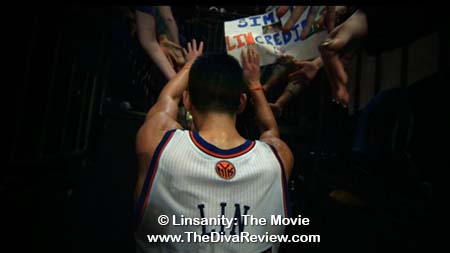 LMD:
What do you think makes Jeremy Linís story different? There are
detractors who would dismiss Linsanity as a flash in the pan or a fluke.
LMD:
What do you think makes Jeremy Linís story different? There are
detractors who would dismiss Linsanity as a flash in the pan or a fluke.
BY: I understand that itís a challenge to get people to watch this film. I think Linsanity is still relevant. I think what Evan has done is created a legacy piece that we want to look back on 15, 20, 50 years from now and remember this story of the journey of Jeremy from the beginning to the top. I think what makes it different other than the obvious fact that heís an Asian-American kid doing a very unstereotypical thing in a world thatís dominated nowadays really by African-American and European men at the highest levels of the NBA - he sticks out like a sore thumb, no question about it - and so every day he puts on his shoes and his jersey and goes out; he represents a community. And he may not necessarily want to wear that cape, or be that torch, but he is, and so I think the story is for so many different people - and not just Asians - thereís the whole Christian story, thereís the whole Ivy-League background, you talk about nerds who are still going, ĎOh, my gosh.í Thereís so many folks, and really, we saw the response from Sundance, to Hong Kong, to here at home in New York; everyone coming from different backgrounds saying, ĎI donít believe in the same God as Jeremy. Iím not Asian. Iím not a basketball fan, but the lessons you take away from what he went through in terms of the perseverance of always being looked at as the ultimate underdog and succeeding is something I could take away and something I could tell my children. Itís something I could apply to my professional life whatever it is Iím doing in life.í Not everyone is going to become an NBA superstar, thatís not what Iím trying to tell here, but thereís pains here that I think anyone can relate to, which is what I think makes this a really special and unique story.
LMD: Youíve made a movie about a guy whoís only 25 years old. Can you picture revisiting this story in a few yearsí time?
BY: Thatís also something we joked about. I donít think Jeremyís story is done in terms of the newsworthy-type thing, because heís always going to be looked at and someone who you say, ĎWhatís going on with Jeremy Lin?í I think thereís going to be another documentary, or even two, when all is said and done. You know he obviously left us in New York, but thereís still a ĎWhat have you done for me?í attitude about him. Heís always still having to prove himself. Itís unfortunate, but itís just the way the world works.
So, heís gone on; heís one year past the hoopla here in New York and heís performed very well in Houston, and the team continues to grow and gel and heís got a lot of years ahead of him. I think the next phase is going to be very interesting. Obviously, weíre watching with great interest and I know, having followed him for so long - and itís still something that frustrates you - that at every stop he gets detractors; from high school, to college, to the NBA. People are going to doubt and wonder and heís going to have to continue to go out and do what he does best. I have faith in the guy; heís been proving it all along. Even if he doesnít play another minute in the NBA at this point, I think what heís done is so incredible and you canít take it away. And he will apply his lessons in his own life to whatever he does post-basketball.
So I think thereís always going to be interest in him and his story and certainly obviously basketball is a big draw and that is what makes him Jeremy Lin; but if he decides to become a pastor, or does non-profit work, and he has an econ degree from Harvard, so he can do so many different things that thereís always going to be a story there that people want to read, hear or see about Jeremy Lin. Weíre just lucky we caught it during the Linsanity part, I guess. {Laughs}
Director Evan Jackson Leong
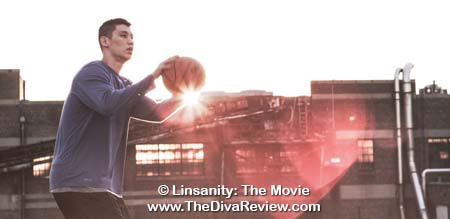 The
Lady Miz Diva: How did Jeremy Lin come to your attention and what was
it about him that made you think heíd make for a great story?
The
Lady Miz Diva: How did Jeremy Lin come to your attention and what was
it about him that made you think heíd make for a great story?
Evan Jackson Leong: I first heard of Jeremy through the internet and then {co-producer} Christopher Chen said, ďHey, I know his family and there might be the possibility to do a documentary on him.Ē I looked more into it and there were a lot of things about him that I could really relate to; we were both Asian-American, both from the Bay Area, and we both played basketball a lot. We both tried for the NBA; I didnít make it, but he did. He represented something I never saw before and I thought he could really inspire the youth of today; 7 or 8-year-olds could have a role model, one of their own skin colour, one of their own journey, one of their own community that they never had before. Maybe there will be another Jeremy Lin because theyíll feel like, ĎIf he could do it, I could do it.Ē
LMD: You were already filming him when Linsanity phenomena hit. How did that affect or change the arc of the story you had in mind?
EJL: Well, we were experiencing what everyone else was experiencing, but it was definitely pretty intense for us. We got caught up in it. We were having fun; yelling and calling each other and watching the games over and over. We needed an ending and he gave us an ending. It was a great ending! It changed from a little internet webisodes series to a full-on, feature-length documentary. Thatís pretty incredible for me as a filmmaker; I never expected to play the AMC {Theatres} at this point in my career.
LMD: Jeremy said he was hesitant for two years before he agreed to do the doc. How did you go about persuading him?
EJL: We did start the shooting; Brian did a little unauthorised shooting in the public domain of Jeremy. A little stalker footage. We hung around and he got to know us a little bit better. I think it speaks to who he is as a person; heís a cool guy. ďWho am I? Why would you want to do a documentary? Iíve done nothing. Iím going to be in the NBA. I havenít met my goals. I havenít got the goals I want to. I donít want a camera crew following me around, I just want to play basketball.Ē If you want to play in the NBA, you donít dream of doing interviews after every game. You donít dream of doing press stuff three times a week, or walking out of your house and getting mobbed. You just want to play basketball; and at that point, thatís what Jeremy wanted. All he wanted to do was focus on basketball. He didnít want a distraction and this goes to his discipline. After a while, he got to know who we were and he trusted us and there was the potential for him to tell his story. Everyone else was writing all these stories about him and all these things. This was his chance to really tell his story.
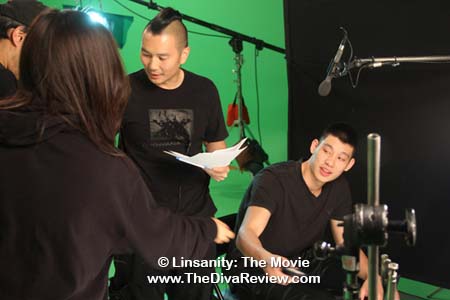 LMD:
One of the things he said made him comfortable filming was how well heíd
gotten to know the crew and your understanding of him and his family.
How did you keep your professional objectivity and present the story as
you envisioned, or did feelings for Jeremy become a consideration?
LMD:
One of the things he said made him comfortable filming was how well heíd
gotten to know the crew and your understanding of him and his family.
How did you keep your professional objectivity and present the story as
you envisioned, or did feelings for Jeremy become a consideration?
EJL: Thatís a good question. This is not my first walk in the park with filmmaking; youíve gotta be very conscious of that relationship and that distance between filmmaker and subject. If you get too close, youíre not going to see what the true vision is, and that vision will be a little blurred from what the actual reality is; but you have to develop a level of trust that enables you to get close. I was always conscious of my position with him. I never hung out with him. I never did anything without a camera, because the camera is going to keep the separation. The camera is going to make sure weíre always on and weíre always filming. That was tiring for both of us, it was definitely tiring for him. It was important because it kept your objectivity at a distance; you donít get caught up in your feelings for the person.
Ultimately, for us, we set out to do a feel-good documentary, not an expose on somebody where weíre trying to change or cover up somebody. Weíre fortunate that Jeremy is who he is on camera and off camera. Thereís no bad stuff that weíre hiding. I think that made it easier, but Jeremy doesnít do any of that, so thereís really no danger in capturing any of that.
LMD: Since your intent was to make a feel-good documentary, how did you judge how much of the ugly side of Jeremyís victory - the racist comments from other professional athletes and commentators - to include?
EJL: I think while it is uplifting, because it is a documentary about an Asian kid trying to make it in the NBA. In that sense, it was an uplifting piece because it was about following your dream. Obviously, you have to deal with everything from the perspective of Jeremy; what he has to deal with. Thereís a lot of positive, but thereís negative. I wanted to view this film in the same way he deals with racism. Heís got a very sort of enlightened state about racism and I think thatís something that can be learned. He knows itís there. Heís experienced it. But what are you going to do? Are you going to let it upset you? Are you going to let it bother you? Youíve got bigger things to worry about than who are these people who feel that way. You have to deal with racism because racism exists. I think what happened with Jeremy was very interesting because at this moment in time, this was the state of racism for Asian-Americans. This was the state of it in the world. I think people are going to be a lot more sensitive to anything that they say since Jeremy has been in the spotlight. But no one ever dealt with it before because no one knew what they could and couldnít say, because there had never been an Asian-American icon like this, who had captured the hearts and minds of people around the world like this.
Weíre not dealing with racism like in the sixties; but racism like this, itís a little more quiet, but itís still there. I think for me in this documentary, we wanted to show that in 20 years from now, youíll pop in this video and youíll say, ĎOh, thatís where racism was then. Thatís how we treated Asian-Americans at that time.í In 20 or 30 years, maybe weíll have an Asian-American president. It takes people like Jeremy to get us to the next plateau of understanding.
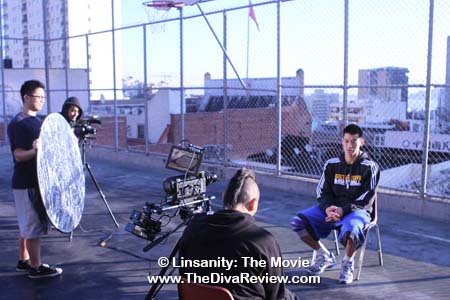 LMD:
What makes Jeremy Linís story different? Many people have dismissed the
Linsanity craze as a fluke.
LMD:
What makes Jeremy Linís story different? Many people have dismissed the
Linsanity craze as a fluke.
EJL: Itís a very unique story. That itís an Asian-American makes it very unique because itís never happened before. And it happened at a time that there was nobody in the world who could not get with this story. All the people that hate now; they were on the wagon when it was happening. I think itís the way media works; media these days has gotta pull things up and theyíve gotta create sides. Thatís the best kind of media; when you create a polarising issue and you pick one side - youíre going to get a lot of supporters, or youíre going to get a lot of haters and thatís going to get you a lot of views, no matter what. Everything in the media now is blown out of proportion, and with Jeremy, I think no one could ever take that away, even the haters cannot get with his story. They may like to hate him and all that, but at the end of the day, his story is universal. Everyone knows what itís like to fail and people say no to you, to not get to where you want to get to, to have your dreams taken away from you. Everyone knows what that feels like. To actually get it is the dream of everybody, to follow your passion and be happy. I think in that sense, Jeremy right now is definitely a polarising figure, but nobody could ever take that away from him, or us as a community.
LMD: What would you like audiences to take away from Linsanity: The Movie?
EJL: I think itís some of the same things that Jeremy talks about; itís become very clear to me and what I can relate to, too, is that Jeremyís story is as universal as the story about him chasing his dream. As bumpy as the road may get as tough as it may go as dark as it may go as dark as it may go, youíve gotta preserve. Youíve gotta find that strength that keeps you going. I think for Jeremy, itís his faith, for me, itís faith, but whatever youíre doing to become happy. To find happiness in the chasing of your dream. I think thatís what this movieís about; itís about chasing your dream.
~ The Lady Miz Diva
JL: Sept 19th, 2013
BY & EJL: Oct 3rd, 2013
On Oct. 5, 2013, TAP-NY will be holding a private screening of Linsanity: The Movie featuring fun, fabulous giveaways, goodie bags, a Q&A with producer Brian Yang & a chance to win a Linsanity poster autographed by Jeremy Lin himself. Click on the link for details: https://www.facebook.com/events/1415675775314193/
© 2006-2022 The Diva Review.com
|
|












